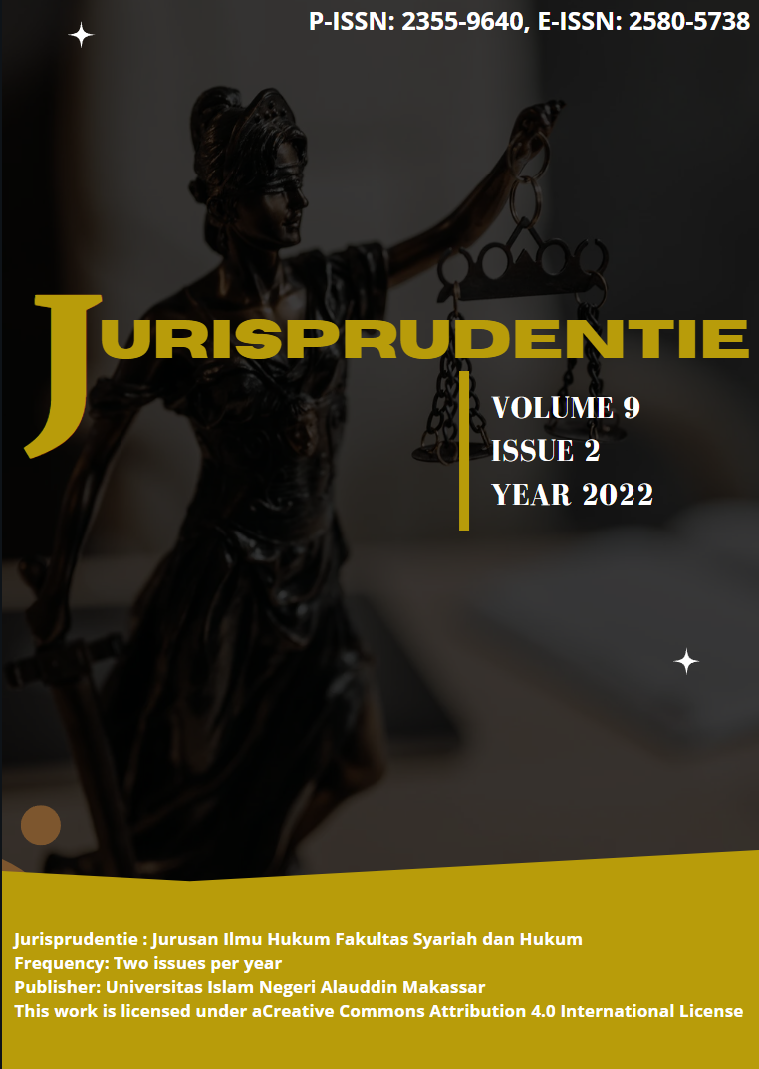Comparative Study of the Concept of the Welfare State According to Liberal, Islamic and the 1945 Constitution
Abstrak
This research aims to elaborate the thinking between the concept of the welfare state and the current understanding of democracy in Indonesia. the research used is normative legal research using a conceptual approach. The research results show that the concept of the welfare state emerged as an alternative to constitutional democracy in the 20th century, which was a reaction to the influence of liberal pluralism in the 19th century. This thinking gave rise to the proposition "the least government is the best government". The Welfare State is currently proven to be able to develop the economy while increasing the standard of living of the people. The current crisis of the welfare state, which is often debated, both in Europe and the United States, is not about its existence, but only about its size and capacity. The welfare state is nothing new in Islam. Before being implemented in the West, the Islamic world practiced it first.
Referensi
Airlangga, Shandi Patria, ‘Hakikat Penguasa Dalam Negara Hukum Demokratis’, Cepalo, 3.1 (2019), 1 <https://doi.org/10.25041/cepalo.v3no1.1783>
Arbani, Tri Suhendra, ‘Analisis Yuridis Pengisian Jabatan Wakil Kepala Daerah Dalam Penyelenggaraan Pemerintahan Daerah’, Supremasi Hukum, 6.2 (2017), 112–39
Asshiddiqie, Jimly, ‘Mahkamah Konstitusi Dan Pengujian Undang-Undang’, Jurnal Hukum, 11.27 (2004), 1–6
ELVIANDRI, E., ‘Quo Vadis Negara Kesejahteraan: Meneguhkan Ideologi Welfare State Negara Hukum Kesejahteraan Indonesia’, Mimbar Hukum - Fakultas Hukum Universitas Gadjah Mada, 2019, 252 <https://doi.org/10.22146/jmh.32986>
Kushidayati, Lina, ‘The Development of Islamic Law in Indonesia’, Qudus International Journal of Islamic Studies, 1.2 (2014), 163–80 <https://doi.org/10.21043/QIJIS.V1I2.185>
Syed Mumtaz Ali, “Social Welfare: A Basic Islamic Value,” 2008, http://muslimcanada. org/welfare. htm.
Siswono Yudohusodo, Membangun Negara Kesejahteraan” : Yogyakarta: Institute for Research and Empowerment (IRE) Dan Perkumpulan Prakarsa (Jakarta: Wisma MM Universitas Gadjah Mada, 2006), 71.
Erwiningsih Winahyu, Hak Menguasai Negara Atas Tanah, 1st ed. (Yogyakarta: Penerbit Total Media, 2009), 63.
Henry T. Simarmata, Negara Kesejahteraan Dan Globalisasi: Pengembangan Kebijkan Dan Perbandingan Pengalaman (Jakarta: PSIK Universitas Paramadina, 2008), 19.
Tri Widodo W Utomo, “Memahami Konsep Negara Kesejahteraan (Welfare State),” accessed November 10, 2016, http://triwidodowutomo.blogspot.nl/2013/07/memahami-konsep-negarakesejahteraan.html.
Moh. Mahfud MD, Dasar Dan Struktur Ketatanegaraan Indonesia (Jakarta: Renaka Cipta, 2012), 64.
Edi Suharto, Membangun Masyarakat Memberdayakan Rakyat (Bandung: PT Refika Aditama, 2009), 154.
Michael P. Todaro, Pembangunan Ekonomi Di Dunia Ketiga, 6th ed. (Jakarta: Erlangga, 1998), 130.
Johara T. Jayadinata, Tata Guna Tanah Dalam Perencanaan Pedesaan, Perkotaan Dan Wilayah (Bandung: ITB, 1999), 180.
SF. Marbun, Hukum Administrasi Negara (Yogyakarta: UII Press, 2001), 20.
Azhary, Negara Hukum Indonesia (Jakarta: UI Press, 1995), 34–35.
Donald A Runokoy, Hukum Administrasi Negara (Yogyakarta: UII Press, 2001), 10.
Wirjono Prodjodikoro, Asas-Asas Ilmu Negara Dan Politik (Jakarta: Eresco, 1991), 13.
Mubyanto, Amandemen Pasal 33 UUD 1945 Yang Dipaksakan”, Dalam Evaluasi Kritis Atas Amandemen UUD 1945 (Yogyakarta: UNISIA, 2003), 238.
Dawam Raharjo, Evaluasi Dan Dampak Amandemen UUD 1945 (Yogyakarta: UNISIA, 2003), 243.
Marzuki, Peter Mahmud, Metode Penelitian Hukum (Jakarta: Kencana, 2017)
Mochtar, Zainal Arifin, ‘Antinomi Dalam Peraturan Perundang-Undangan Di Indonesia’, Hasanuddin Law Review, 1.3 (2015), 316 <https://doi.org/10.20956/halrev.v1n3.112>
Republik Indonesia, ‘Undang-Undang Dasar Negara Republik Indonesia Tahun 1945’, 1945
Sumardi, Dedy, Ratno Lukito, and Moch Nur Ichwan, ‘Legal Pluralism within the Space of Sharia: Interlegality of Criminal Law Traditions in Aceh, Indonesia’, Samarah, 5.1 (2021), 426–49 <https://doi.org/10.22373/sjhk.v5i1.9303>
United Nation, ‘Universal Declaration of Human Rights (UDHR) 1948’, United Nations General Assembly (United Nations)
Wibowo, Mardian, ‘Menakar Konstitusionalitas Sebuah Kebijakan Hukum Terbuka Dalam Pengujian Undang-Undang’, Jurnal Konstitusi, 12.2 (2016), 196 <https://doi.org/10.31078/jk1221>
Once an article was published in the journal, the author(s) are:
- to retain copyright and grant to the journal right licensed under Creative Commons License Attribution that allows others to share the work with an acknowledgement of the work's authorship.
- permitted to publish their work online in third parties as it can lead wider dissemination of the work, with an acknowledgement of its initial publication in this journal
- continue to be the copyright owner and allow the journal to publish the article with the CC BY license
- receiving a DOI (Digital Object Identifier) of the work.


